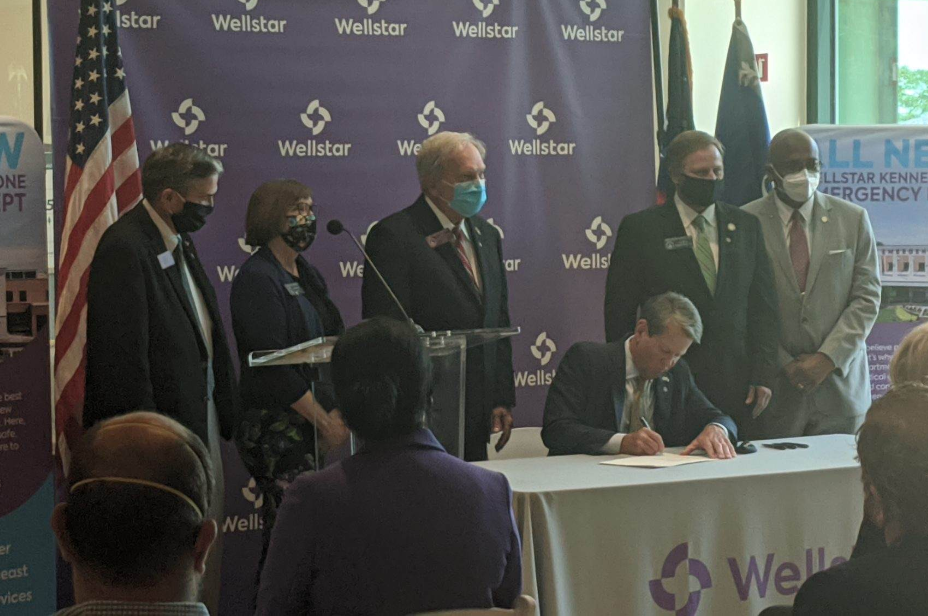Despite having health insurance, one in five adults have received a surprise medical bill from an out-of-network provider in the past two years alone. For many consumers, these bills have created serious financial burdens for themselves and their families.
 While Congress has failed to address the issue at the federal level, many states have taken action to protect their residents from surprise medical bills — and now, Georgia is the latest state to join the effort. Georgia’s Surprise Billing Consumer Protection Act (HB 888) passed with unanimous support in the state Senate and with overwhelming support in the House. The bill was signed into law on July 16, 2020. Beginning in 2021, an estimated 2.5 million Georgia residents will be protected from surprise medical bills. Kevin Lucia and Jack Hoadley, research professors at Georgetown University, discussed what is included in the final policy here.
While Congress has failed to address the issue at the federal level, many states have taken action to protect their residents from surprise medical bills — and now, Georgia is the latest state to join the effort. Georgia’s Surprise Billing Consumer Protection Act (HB 888) passed with unanimous support in the state Senate and with overwhelming support in the House. The bill was signed into law on July 16, 2020. Beginning in 2021, an estimated 2.5 million Georgia residents will be protected from surprise medical bills. Kevin Lucia and Jack Hoadley, research professors at Georgetown University, discussed what is included in the final policy here.
This victory is the testimony of a strategic five-year advocacy effort led by Georgians for a Healthy Future and Georgia Watch. Laura Colbert, the Executive Director of Georgians for a Healthy Future, shared four key lessons from their advocacy efforts:
- Having a seat at the policy discussion table – Early in 2015, Georgia advocates engaged in various discussions on network adequacy policies in the state. They successfully positioned themselves as policy experts, providing consumer perspectives on the issue and gained support from policymakers, health plans and provider groups. Following the 2015 legislative session, because of their deep policy knowledge on the issue, the former executive director of Georgians for a Healthy Future was appointed to serve as a consumer representative on Georgia’s Consumer and Provider Act study committee. The study committee was charged to examine all aspects of network adequacy (from quantitative standards and provider directories to surprise medical bills).
- Creating a safe space for all stakeholders to discuss policy solutions and draft legislative language – Although addressing surprise medical bills has gained bipartisan support, disagreements on how to solve payment disputes between providers and insurers can stall the entire effort. Laura Colbert offered some insight here. To overcome this impasse, in 2016, Georgians for a Healthy Future and Georgia Watch hosted a policy forum titled Getting What You Pay For to create a safe space for policymakers, representatives from provider
 groups, health plans and consumer advocacy groups to discuss policy options for Georgia. In addition, advocates assisted policymakers in drafting legislative language and worked to unify stakeholders with different interests.
groups, health plans and consumer advocacy groups to discuss policy options for Georgia. In addition, advocates assisted policymakers in drafting legislative language and worked to unify stakeholders with different interests. - Being nimble – Achieving a comprehensive approach on network adequacy is a long-term goal. However, given the complex and multi-faceted nature of the issue, Georgia advocates have adopted a number of short-term solutions that had a more promising path to victory. For instance, between 2016 and 2017, Georgians for a Healthy Future and Georgia Watch focused their conversations around improving provider directories, a small step to address surprise medical bills and ensure access to care. This led to the successful passage of SB 302 (one of the strongest provider directory laws in the country) which requires health plans to keep their provider directories current at all times and clearly state that enrollees are not responsible for out-of-network charges if they rely on inaccurate provider directories. Read our case study here to learn more about their advocacy strategies.
- Identifying legislative champions who can unite stakeholders with different interests – As mentioned above, disagreements on out-of-network payment solutions are the main barriers to a successful passage of surprise medical billing protection legislation. Georgians for a Health Future and Georgia Watch have continuously built, strengthened and leveraged their relationships with legislators such as Senator Chuck Hufstetler, Chairman Richard Smith and Representative Lee Hawkins — who agreed to facilitate a united front strategy and sponsor legislation. Georgia advocates also collaborated with national experts from Georgetown University’s Center on Health Insurance Reform to share approaches from other states and the latest information on federal proposals. These conversations sparked new ideas for Georgian policymakers — who collectively developed a Georgia-specific solution. This united effort led to support from Governor Kemp’s office and a diverse stakeholder coalition (including providers, health plans and patient groups).
Congratulations to our partners in Georgia for their significant achievement! Like we’ve seen in other states, it took multiple years for Georgia to enact comprehensive consumer protections against surprise medical bills. However, Georgia advocates have proven that a policy win can happen in a state with a challenging political environment as long as state policymakers, stakeholders and consumer advocacy groups are willing to work together to tackle one of the major health concerns for consumers.
